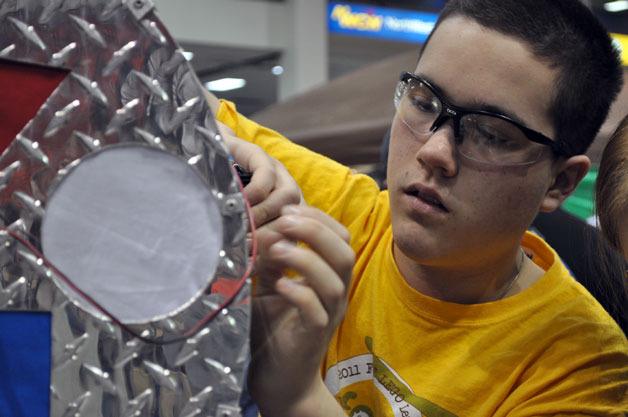ARLINGTON — Even after a build season that was shortened by a full week due to the first snowstorm of the year, the Arlington High School Robotics Club did better in the FIRST Robotics Competition at Qwest Field in Seattle this year than they’ve done since starting up in 2008.
“We made it to the semifinals, which is further than we’ve ever been,” said Josh Rodriguez, the sophomore public relations officer for the Arlington High School Robotics Club. “At two times during the competition we placed sixth out of about 45 teams at the regional. It was unfortunate that we didn’t make it past the semifinals, but we made a lot of progress this year and I’m very happy with where we ended up.”
“I think we did very well,” agreed Caroline Vogl, the freshman head web designer and photographer for the team. “The NeoBots normally finish in the middle, but this time we placed higher and were chosen for an alliance for the finals.”
The March 22-24 FIRST Robotics Competition in Seattle marked the culmination of a build season that began on Jan. 7 of this year for the roughly 28-member AHS team, who had to assemble a robot capable of surmounting the multiple challenges of the “Rebound Rumble,” during which alliances of teams had to sink as many basketballs into hoops as they could during matches that lasted two minutes and 15 seconds each, and concluded by tasking the robots with balancing on bridges.
“The higher the hoops that your robot makes baskets in, the more points your team scores,” Rodriguez said.
Robert Haynes, the junior-year treasurer and assembly manager for the team, explained that the first week of the six-week build season was devoted to designing their robot, based on basic strategic decisions such as whether their robot would play offense or defense. Sean McClenaghan, the junior-year lead programmer for the team, added that this phase was followed by more in-depth prototyping, to make sure their plans would work as well in the real world as they did on paper.
“Even though we lost a week of build time due to snow this year, we still did better than last year,” Rodriguez said.
“Last year, our robot wasn’t complete by the time we had to ship it off to Qwest Field,” McClenaghan agreed. “This year, it was already fully operational with three days to spare.”
Trevor Staiger, the team’s senior vice president, noted that they designed their robot to shoot offensively for the highest hoop. In spite of their lost time, Rodriguez believes the team benefited from a number of new members this year, who helped expedite the programming and mechanics phases of the build season.
“I’ve been with this team for four years, and I’m proud to see their progress,” said Justin Haynes, the senior electronics lead. “There were so many ideas that we all melded into this one robot. Not only did this help us develop as problem solvers, but it even strengthened skills we already had. I already knew a few things about electronics, but through this experience, I’ve gained more knowledge than I would have done in a normal high school career.”
The Arlington High School Robotics Club had never won an award before, but the team was awarded the Gracious Professionalism Award this year, which Rodriguez credited largely to Justin Haynes’ work in assisting a number of other teams with their technical problems.
“Even though you’re competing, you want to help each other achieve,” Justin Haynes said.
“We were surrounded by a lot of great teams that were willing to help out and donate parts,” Rodriguez said.
“It’s about being worthy opponents,” Vogl said. “We did better this year in general, because we decided to go for more awards than in previous years.”
As much as she strived to remain gracious, Vogl nonetheless felt heartened to see her team’s robot performing better during a practice session in Tacoma than the other teams in attendance, especially given her belief that the Arlington High School Robotics Club was held back a bit by its tight budget.
For his part, Rodriguez suspects some members of the team could have done with a few more hours of sleep, although he praised his team for being alert and awake enough to recover quickly when their robot’s conveyor slipped off.
“The biggest problem, however, was during the first match of semifinals, when all three robots on our alliance lost connection after the autonomous period and sat there doing nothing for the rest of the match,” Rodriguez said. “Our team came to the competition very prepared for what was to come, though, and for the most part we did well in the matches we were in.”
Rodriguez’s experience taught him not to fix parts of the robot that aren’t broken, but he also spoke highly of the other teams for their cooperative spirit.
Although Vogl was a bit disappointed not to receive the Chairman’s Award that she’d worked so hard for, she was gratified to be able to get her photo taken with FIRST founder Dean Kamen, whose visit to the Seattle regionals was a surprise.








